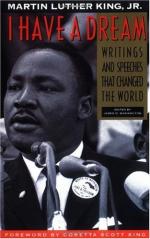
|
| Name: _________________________ | Period: ___________________ |
This test consists of 5 multiple choice questions, 5 short answer questions, and 10 short essay questions.
Multiple Choice Questions
1. How many federal marshals were dispatched by Attorney General Robert F. Kennedy?
(a) 400.
(b) 600.
(c) 200.
(d) 500.
2. What were the nicknames of the African Americans who traveled from state to state even though they were prohibited from doing so because of white co-passengers?
(a) Riders.
(b) Freedom Riders.
(c) Challengers.
(d) Freedom Challengers.
3. When was the historic Brown vs. Topeka, Kansas Board of Education Supreme Court decision handed down?
(a) March 17, 1957.
(b) May 17, 1954.
(c) December 1, 1955.
(d) April 1, 1955.
4. What happened to Dr. King as he was signing books on September 20, 1958?
(a) He was stabbed.
(b) He was shot.
(c) He was verbally assaulted.
(d) He was punched.
5. What famous black child psychologist embraced the liberal idea that where there is no equal opportunity to succeed there can be no social equality?
(a) Dr. Kenneth B. Clark.
(b) Dr. Terrance P. Patrick.
(c) Dr. Daniel N. Meyers.
(d) Dr. Joseph M. Dryers.
Short Answer Questions
1. What city in Tennessee had a race riot on February 23, 1960?
2. On what date did Rosa Parks refuse to give up her seat on a Montgomery bus?
3. On what date was interstate traveling first challenged by an African American?
4. What did the assailant ask Dr. King right before his assault on September 20, 1958?
5. What laws did African American interstate travelers ignore during their public transportation across state lines?
Short Essay Questions
1. According to King's speech "Our Struggle," why did many black men lose their self-respect?
2. What were the reasons that King's trip to India kept getting put off?
3. What happened on December 5, 1955?
4. According to King's speech "The Rising Tide of Racial Consciousness," why had some African Americans become cynical and disillusioned?
5. When Rosa Parks was asked why she did not move from her seat on the bus, what did she answer?
6. According to "Speech Before the Youth March for Integrated Schools," what would have happened in the United States if the country were to gain three million "southern Negro" votes?
7. According to King's speech "The Rising Tide of Racial Consciousness," what were some of the factors that led to a new sense of self-respect on the part of the African American?
8. What happened on December 1, 1955, to initiate the forward movement of the Civil Rights Movement?
9. According to "Speech Before the Youth March for Integrated Schools," what did the denial of the right to vote do to African Americans?
10. According to King's speech "The Rising Tide of Racial Consciousness," what were the problems associated with the shift from rural to urban life for African Americans?
|
This section contains 914 words (approx. 4 pages at 300 words per page) |

|




